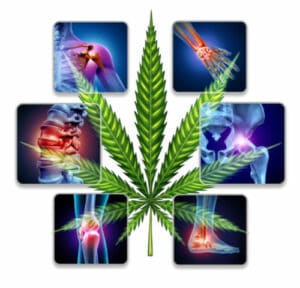

How To Get an Ohio Medical Marijuana Card for Arthritis
- Can you get an Ohio medical marijuana card for arthritis?
- Although arthritis is not specifically listed, it does fall under the category of chronic pain.
- Compounds found in medical marijuana help to reduce inflammation and pain of arthritis.
- Cannabis can also help to subdue the autoimmune response that causes arthritis.
Arthritis is not specifically listed among the qualifying conditions for medical marijuana in Ohio. However, seeing as the number one symptom of arthritis is pain, patients are potentially eligible to shop at Ohio dispensaries.
In this post, we’ll talk about how to get a medical marijuana card for arthritis in Ohio. We’ll also go over the details of how marijuana helps relieve arthritis pain. We’ll illustrate how arthritis patients are using to treat chronic pain and even to slow the progression of arthritis. And finally, we’ll list some of the cannabis products that are available at Ohio dispensaries.
How does medical marijuana help treat arthritis?
Rheumatoid arthritis is what is known as an autoimmune condition. Autoimmune conditions cause the patient’s immune system to attack the soft tissues that are meant to protect joints. This attack damages the tissues and causes inflammation and pain and stiffness. As the condition progresses it can cause mobility problems.
As such, arthritis patients have a few issues that need to be dealt with. First, there’s the cause of the condition — autoimmune attacks. Next, there’s the inflammation and pain caused by the attacks. And finally, there’s the progression of the symptoms. Fortunately, medical marijuana helps to reduce all three of these problems in some patients. And it does so safely when used properly.
Traditional treatments for arthritis often come with unwanted, long-term side effects. Medical marijuana is completely non-toxic with very few if any side effects when patients are following a proper protocol. Marijuana is also non-addictive. And there are also various medical marijuana strains and cannabis-infused products that contain little or no THC and are non-intoxicating.
THC is the intoxicating and euphoria-producing compound found in the flowers of the female cannabis plant. THC is part of a class of compounds known as cannabinoids. There are actually scores of cannabinoids. THC and CBD are the most abundant in most strains of cannabis. There are also other minor cannabinoids such as CBG and CBN. Of these, only THC is intoxicating.
Interestingly, CBD and other cannabinoids interact with the brain differently than THC. They can actually temper wanted and unwanted effects of THC. For example, CBD can help to lessen the risk of experiencing feelings of paranoia that can come with excessive THC use.
There are several sources of cannabinoids. The human body produces a class of cannabinoids called endogenous cannabinoids, or endocannabinoids. Cannabis produces what are called phytocannabinoids. And there are also synthetic cannabinoids such as dronabinol and Marinol that we refer to as exogenous cannabinoids.
The latter types have the ability to affect the human endocannabinoid system or ECS by mimicking our own natural endocannabinoids in certain ways. The ECS is responsible for regulating a wide array of bodily functions including immune response, inflammatory response, and pain response. It also affects appetite, sleep cycles, moods, and so on.
When the brain detects an imbalance in any of these systems it produces endocannabinoids. They flood the bloodstream and circulate throughout the body where they interact with receptors on the surface of cells. This chemical signaling system is the brain’s method of relaying instructions
Some medical marijuana doctors conjecture that autoimmune conditions are caused in part by an endocannabinoid deficiency or a lack of cannabinoid receptors. They suspect that supplementing with phytocannabinoids can help regulate the immune response in some patients thereby reducing the damage and slowing the progression of arthritis.
Cannabinoids such as CBD are also renowned for their ability to reduce the inflammation that’s caused by arthritis. Inflammation is the major cause of pain in the beginnings of arthritis. Furthermore, THC actually has the ability to reduce the perception of pain in some patients by regulating the pain signals sent to the brain.
How to use medical marijuana to treat arthritis
As we mentioned earlier, medical marijuana helps arthritis patients in several ways. And certain cannabinoids and delivery methods are more suitable for treating the various aspects of arthritis.
Treating an autoimmune condition requires a systemic approach. This means producing steady levels of cannabinoids in the bloodstream. On the other hand, pain can arise suddenly in arthritis patients. These sudden onset symptoms are better served using delivery methods with a fast onset time. And finally, inflammation can be treated at the site of pain using topical preparations such as cannabinoid-infused skin creams.
The delivery methods with the fastest onset times and highest potency are inhalation methods. These include smoking or vaping dried flower, cannabinoid-infused vape pens, dabbing, and inhalers. These products provide almost instantaneous effects. (Patients suffering from lung or circulatory conditions should avoid smoking and vaping.)
The product that produces the most steady cannabinoid levels is cannabinoid-infused transdermal patches. These patches adhere to the skin delivering a steady flow of cannabinoids that are absorbed through the skin over time.
Oral preparations such as cannabis-infused oils, capsules, and cannabis edibles also produce more steady blood levels. However, oral cannabis products offer a slow onset time and low bioavailability (the amount that enters the bloodstream). For best results when treating arthritis, oral applications are best taken with a meal.
Tinctures are drops that are delivered sublingually (under the tongue) where the cannabinoids can be absorbed directly into the bloodstream.
Which medical marijuana strains and formulas are best for treating arthritis?
Each of the cannabinoids mentioned above has its own benefits. And those benefits will vary from patient to patient. For most patients, a product containing a spectrum of cannabinoids produces the best results. However, some patients may not wish to consume THC. And patients that do consume THC are advised to do so in low dosages. High-CBD products can be very helpful for reducing inflammation even without the presence of THC.
Patients who wish to avoid THC might also consider using products produced from hemp. Strains of cannabis that produce less than 0.3 percent THC are classified as hemp. And hemp products are legal in Ohio. Anyone can buy CBD online or at local shops without a medical marijuana card.
Best medical marijuana strains for treating arthritis

A recent report by the Journal of Headache Pain claimed that patients suffering from arthritis recommend these medical marijuana strains.
- OG Shark
- Cannatonic
- Sweet Skunk
- Jack Herer
- Warlock CBD
- Lemon Sour Diesel
- White Widow
- Pink Kush
- Master Kush
- Island Sweet Skunk
- Girl Scout Cookies
- Skywalker OG
- Jean Guy
These strains might not be available at Ohio medical marijuana dispensaries. A knowledgeable budtender should be able to recommend a strain based on the patient’s needs.
Because medical marijuana affects each patient differently, some experimentation might be required to find the ideal strain, formula, dosage, and delivery method for each case.
Although hemp-derived CBD products can be purchased without an Ohio marijuana card, patients suffering from arthritis should not be self-medicating. Patients are strongly advised to consult with a knowledgeable medical marijuana doctor.








